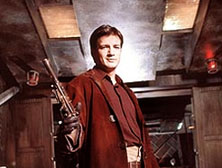October 3, 2005
TV ON DVDFirefly: The Complete Series
 |
So says Joss Whedon on the making-of documentary on the fourth disc of the Firefly boxed set. With the feature-film Serenity now out in theaters, there are roughly 10,000 articles on the internet right now that dissect the history of Firefly in minute detail, so we'll just gloss over it a bit, shall we?
Blah blah Joss Whedon, blah blah new sci-fi series for Fox, blah blah blah, Fox not actually interested in series itself, blah blah, aired episodes out of order, blahbiddy, Friday night timeslot of imminent cancellation, blah bloo series canceled after 12 episodes. But hey, now there's a movie!
But let's focus on the series. Firefly is an outer space Western, taking the concept of "the new frontier" and infusing it with equal parts Star Wars and John Ford. Set 500 years in the future, the series sees humanity abandoning earth and terraforming a whole new galaxy. The central planets are controlled by the fascistic Alliance, while the outer planets are left to roving outlaws as well as cannibalistic shards of humanity known as Reavers.
Among the outer planets sail our heroes, a gang of petty thieves and smugglers who crew a Firefly-class starship known as Serenity. The captain is Mal Reynolds (Nathan Fillion) who runs the ship along with his first mate Zoe (Gina Torres), both of whom were on the losing side of a civil war with the Alliance. Also on board is mechanic Kaylee (Jewel Staite), pilot Wash (Alan Tudyk), hired gun Jayne (Adam Baldwin), and Inara (Morena Baccarin), a high-class Companion (that's future-talk for "prostitute"). In the pilot episode, the ship takes on three additional passengers: Book (Ron Glass), a preacher; Simon (Sean Maher), a doctor; and his sister River (Summer Glau), who was kidnapped by the Alliance and brainwashed into becoming a telepathic super-soldier.
The cast is game, with Fillion and Baldwin being the primary standouts. Baldwin's Jayne has the advantage of being given most of the best lines, but Baldwin handles them with aplomb, infusing the character with a humanity that saves him from being reduced to a caricature. The bulk of the series, however, rests on Fillion's shoulders, and he's impressively up to the task. Mal's an angry, sarcastic character, but Fillion never makes him unsympathetic, even when the character is at his worst. If the cast has any weak links, it's Maher and Baccarin, whose upper-class characters often come across as stilted rather than reserved or measured. Each shows improvement as the series progresses, though. Maher in particular shines in the episode "Ariel," arguably the best episode of the series.
| What they aired instead was "The Train Job," a rushed, muddled episode that had to serve as the series' pilot, conveying all the information in "Serenity" in half the running time. Oh, and Whedon and co-executive producer Tim Minear had only a weekend to write the episode. |
The remaining episodes, however, show a remarkably high level of quality for a new major-network series. When Firefly premiered, Whedon already had two other shows on the air, and his extensive television experience and knack for dialogue and character-driven drama is obvious. The previously-mentioned "Ariel" blends all the best aspects of the series, including an exciting heist, exceptional world-building, unexpected twists, and starkly realized characters. Other episodes, such as "Shindig" and "Jaynestown," focus on humor, while "The Message" and "War Stories" take darker turns. The series takes these shifts of tone in stride, proving itself adept at shifting from drama to humor to pathos.
This isn't to say there aren't problems. The cast could certainly use thinning out, as some characters only get a few select lines an episode, and poor Shepherd Book is marginalized from the get-go, with only the occasional hint that he's more than he seems (a plot thread that, like so many others, is never paid off). Simon and Kaylee's drawn-out attraction, along with Mal and Inara's obvious secret love grow repetitive even in the series' brief run. The "aw shucks" colloquialisms that are peppered throughout the dialogue occasionally prove too much for the actors to pull off naturally, and the tendency for characters to have brief exchanges in Chinese is a better idea on paper than in execution. It should be noted, though, that the "China meets the American West" motif regularly results in splendid set and costume design.
In the end, what really sets Firefly apart from most televised science-fiction is its emphasis on characters and its sense of fun. Big Ideas are not its primary concern, and while it certainly has typical sci-fi fodder like the Orwellian Alliance, its focus remains on the crew of Serenity and their reactions to their world, rather than any allegories for our own.
Email the author.
Return to Season 2, Episode 2.
All written content © 2005 by the authors. For more information, contact homer@smrt-tv.com
